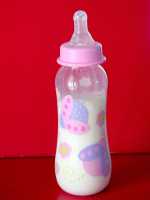
14 Nov Soy Formula Feeding in Infancy Linked with Menstrual Pain in Adulthood
MedicalResearch.com Interview with:
 Kristen Upson, PhD, MPH and
Kristen Upson, PhD, MPH and
Donna D. Baird, PhD
Epidemiology Branch
National Institute of Environmental Health Sciences
Research Triangle Park, NC 27709
MedicalResearch.com: What is the background for this study? What are the main findings?
Response: Menstrual pain is the most common menstrual complaint and can substantially affect the quality of women’s lives. A prior study in young adults who participated in feeding studies as infants reported an increased risk of greater menstrual pain severity in adulthood with soy formula feeding. Since that study, evidence from laboratory animal studies support the disruptive effects of a phytoestrogen present in soy formula, genistein, on reproductive system development, including aspects involved in menstrual pain. The laboratory animal studies also demonstrate that the developmental changes with genistein can persist into adulthood. Given these results, we were interested in further evaluating the association between infant soy formula feeding and menstrual pain in a cohort of young women.
In our study of women ages 23-35 years old, we observed that soy formula feeding during infancy was associated with several indicators of severe menstrual pain in reproductive-age women. This included a 40% increased risk of ever using hormonal contraception for menstrual pain and 50% increased risk of moderate/severe menstrual discomfort with most periods during early adulthood.
MedicalResearch.com: What should readers take away from your report?
Response: Exposures – even those that occur earlier in life – may increase a women’s risk of experiencing menstrual pain.
MedicalResearch.com: What recommendations do you have for future research as a result of this work?
Response: Menstrual pain is the most common menstrual complaint and can have a substantial impact on the quality of life, affecting school performance, work productivity, and relationships. The additional study of factors which may increase a women’s risk of experiencing menstrual pain is warranted to inform prevention efforts and improve women’s health.
MedicalResearch.com: Is there anything else you would like to add?
Response: We are frequently asked about advice to parents and caregivers about soy formula feeding. It is important to point out that since our study was observational, we are not able to show that soy formula causes menstrual pain, but only that there is an association in our study sample. Our study is not sufficient for changing infant feeding recommendations.
The American Academy of Pediatrics (AAP) promotes human milk as the ideal source of nutrition for infants. It does not recommend soy formula for babies born premature. For full term infants, the AAP recommends soy formula in rare cases where the infant’s body cannot breakdown the sugars in milk (galactosemia and hereditary lactase deficiency) or if the family prefers a vegetarian diet.
We would also like to acknowledge the sources of funding that made this research possible. This research was funded by the Intramural Research Program of the NIH, National Institute of Environmental Health Sciences, and in part by funds allocated for health research by the American Recovery and Reinvestment Act. This research was also supported by the National Institute of Nursing Research (grant K99NR017191).
Citation:
Upson K, Adgent MA, Wegienka G, Baird DD. 2018. Soy-based infant formula feeding and menstrual pain in a cohort of women aged 23-35 years. Hum Reprod; doi: 10.1093/humrep/dey303 [Online 9 November 2018].
[wysija_form id=”3″]
[last-modified]
The information on MedicalResearch.com is provided for educational purposes only, and is in no way intended to diagnose, cure, or treat any medical or other condition. Always seek the advice of your physician or other qualified health and ask your doctor any questions you may have regarding a medical condition. In addition to all other limitations and disclaimers in this agreement, service provider and its third party providers disclaim any liability or loss in connection with the content provided on this website.
Last Updated on November 14, 2018 by Marie Benz MD FAAD
